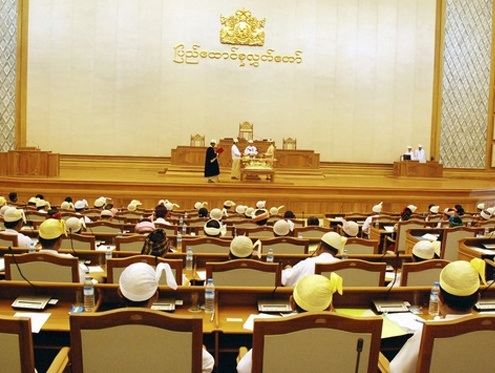Burma’s notorious armed forces will continue to receive the largest portion of next year’s national budget, despite criticisms from a number of MPs over the lack of transparency in the ministry’s expenditures and policies.
The defence ministry has been allocated 20.86 percent – or over one fifth – of the national budget for the fiscal year 2013-2014, which is currently being debated in parliament. It represents an incremental decrease from the previous year, when it received around one quarter of the national budget.
“The defence budget is 20.86 percent – the highest percentage – of the national expenditure and the MPs didn’t discuss much about it. The government did not provide much detail for the allocation,” Pe Than, representing the Rakhine Nationalities Development Party (RNDP) in Myebon township, told DVB. But he added that MPs did question the ministry’s lack of accountability.
It follows several days of heated debate over the allocation of government spending in next year’s budget, during which MPs criticised the defence ministry for its failure to account for its activities, especially in the conflict-torn and resource-rich Kachin state.
Lower house MP Daw Dwebu, who represents the Unity and Democracy Party of Kachin State, reportedly pressured the army over its lack of accountability in the conflict-torn region. She is also a member of the internal peace-making committee and has previously called on the armed forces to withdraw its troops from the northern state, where a civil war has raged for nearly 20 months.
“Daw Dwebu of Injaryang township called out the Tatmadaw [armed forces] for its lack of transparency and urged it to become reliable and trusted by the people,” said Min Thu from the National League for Democracy.
Although the deputy defence minister, Maj-Gen Kyaw Nyunt, yesterday pledged to consider the concerns raised in parliament in “accordance with the constitution” it is unclear if any amendments will be made. Although MPs are entitled to question the government’s budget, they have no formal input into its planning.
Opposition leader Aung San Suu Kyi were among the MPs who called for amendments to the 2013-2014 National Planning Bill, insisting that the budget must “reflect the people’s desire”.
Pe Than told DVB that the union parliament’s speaker, Khin Aung Myint, also yesterday reminded government ministers to listen to MPs and their constituents. “He urged them to actually listen to the MPs and respond to their discussions and not to only read out their work programmes,” he said.
Other MPs, especially in resource-rich areas, also raised concerns over the lack of regional autonomy in governing Burma’s economy, while others criticised the government’s failure to tackle corruption in the civil service.
Daw Nan Wah Nu, who represents Kunhing constituency in the resource-rich Shan state, portrayed “red-tape as a reason for illegal trade” and “threat to national income”, according to a report in state media. “Timber extraction and minerals mining have never ceased in the region,” warned Daw Nan Wah Nu.
The quasi-civilian government led by President Thein Sein has pledged to improve transparency and good governance in the former pariah state, since taking office in March 2011. But questions remain over whether he will be able to rein in the notoriously secretive armed forces, which is known to have significant financial interests in Burma’s lucrative natural resource industries.
Inside sources say that while the new budget is likely to include some natural resource revenue, not all of it will be included. The military also enjoys the benefits of a Special Funds Law, announced in March 2011, which allows the army chief to channel unlimited finance to the military without parliamentary consent.



